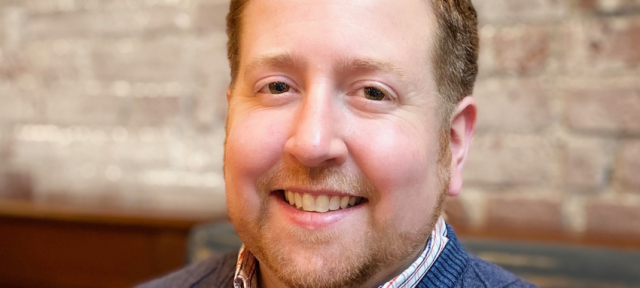Randy Furash-Stewart 99F Wins Advancing Equity & Justice Award from the Massachusetts Commission on LGBTQ Youth

Educator and gender and sexuality alliance adviser Randy Furash-Stewart and colleague Jeremy Mailloux are recognized for their work supporting LGBTQ+ students.
In an interview with the College, Hampshire alum Randy Furash-Stewart 99F speaks to the Hampshire experience, the joys and challenges of being an educator, and the importance of trans awareness in our schools.
What did you study at Hampshire? What was your Div III?
I studied social constructions of race and gender, looking at the ways American society forms these categories and how they’re used to structure systems of power. As part of this, I also studied video and film production. My Div III was called “Critical Multiculturalism: Challenging Power Through Media Literacy in Social Sciences Education,” and in it I examined the ways power can be disrupted in social studies classrooms by having students analyze and question primary sources, their textbooks, and even their teachers. As part of this, I led students at Amherst Regional Middle School in an after-school club to create their own video about Black History Month.
What are you doing now? How did your experience here influence your current work?
I’m a social studies teacher and a gender and sexuality alliance (GSA) adviser at Franklin County Technical School, in Turners Falls, Massachusetts. At Hampshire, I was president of the Queer Community Alliance for a time. Through this, I was able to build on the activism experience I'd gained as the cofounder of the GSA at my high school. I gained skills in organizing events and trips.
As a social studies teacher, I’m always thinking about power in my classroom and who are the holders and creators of knowledge. Recently, I started teaching a senior elective about activism, based entirely on student interests — what issues they want to learn about and what they want to work to change.
The biggest thing I learned at Hampshire is about time management. As a teacher and GSA adviser, I have a lot of responsibilities, but I also have unstructured time during planning periods when I’m alone in my classroom. Hampshire taught me to structure my priorities and my time so I‘m able to be self-directed.
Can you tell us about winning the Advancing Equity & Justice Award from the Massachusetts Commission on LGBTQ Youth?
In April 2023, my GSA co-adviser and I were recognized for our work supporting LGBTQ+ students. Our students — like many other LGBTQ+ young people around the country — have been facing increased homophobia and transphobia at school and in the community. Unfortunately, their lives and identities have been politicized, but they’re still just teenagers trying to get through the school day and prepare for life beyond high school.
I’m especially proud of the trans awareness training that my co-adviser and our GSA students helped to create with the support of the school administration. Utilizing my video production experience from Hampshire, we created a short video of our trans students talking about their experiences in school. I was able to shoot and edit a very powerful video, remembering skills I hadn’t used in a long time.
This showed faculty and staff the struggles these students face each day and gave them positive examples of how these students have felt supported. In addition, we brought in trainers from the Safe Schools Project at the Massachusetts Department of Elementary and Secondary Education. They did a beautiful job emphasizing the importance of supporting trans students and helping faculty and staff at our school gain the skills to do so.
How did Hampshire prepare you for graduate school?
As a teacher, you never stop learning, and Hampshire prepared me to be a lifelong learner. To become a teacher, I attended a rigorous one-year graduate teacher-preparation program at the University of Massachusetts Amherst. The program was incredibly intense because I was in the classroom all day on an internship and then taking graduate classes after the school day ended. A lot of people struggled with the program, but I was successful because I knew how to manage my own time and I knew how to write papers at a graduate level. I was much more prepared than most of the other people in my program.
Seventeen years into my teaching career, I’m back in graduate school to get my education specialist degree, which is like an advanced master’s in teaching. I’m getting to choose my own educational path. Once again, I’m designing my own program of study, and balancing the responsibilities of teaching and taking classes, using the skills I learned at Hampshire.



